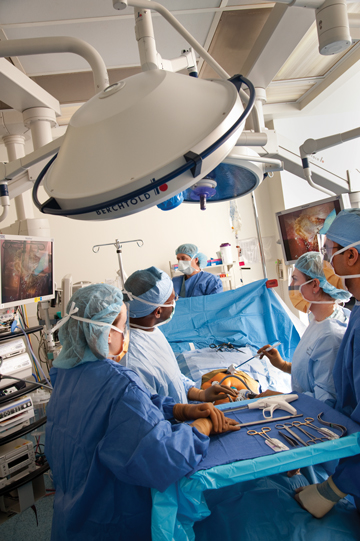Focus on What’s Necessary at Year’s End
The holiday season can throw some employees off track, draining their levels of engagement and enthusiasm for their jobs at the end of a long year....
This website uses cookies. to enhance your browsing experience, serve personalized ads or content, and analyze our traffic. By clicking “Accept & Close”, you consent to our use of cookies. Read our Privacy Policy to learn more.
By: OSD Staff
Published: 8/17/2020
 INCREASED CAPACITY Surgery centers can take on more outpatient procedures to free up hospital ORs for complex cases.
INCREASED CAPACITY Surgery centers can take on more outpatient procedures to free up hospital ORs for complex cases. As the coronavirus surges in parts of the nation, several national healthcare organizations have teamed up to ensure health systems continue to perform essential surgeries and remain prepared to treat patients hospitalized with COVID-19. The Association of periOperative Registered Nurses (AORN), American College of Surgeons (ACS), American Society of Anesthesiologists (ASA) and American Hospital Association (AHA) released a roadmap for providing safe surgical care in areas of the country hit hard by the pandemic.
The joint statement builds on the organizations' roadmap for resuming elective surgeries released on April 17. In the new guidance, the organizations stress:
The guidance also suggests hospitals partner with surgery centers to expand surgical capacity. "Many patients see ASCs as the provider of choice for surgery, as they are aware that COVID-19 patients have not been cared for in these facilities," says AORN CEO and Executive Director Linda Groah, MSN, RN, CNOR, NEA-BC, FAAN. "The potential for expanding the capacity in the ASC allows complex procedures to be performed in hospital operating rooms."
"As part of moving cases to ASCs, it is encouraged that waivers be addressed allowing ASCs to increase the average length of stay for postoperative patients," adds Ms. Groah. "This will be dependent on having the appropriate staff to care for patients."
Joe Paone
The holiday season can throw some employees off track, draining their levels of engagement and enthusiasm for their jobs at the end of a long year....
While this year’s celebration of America’s nearly 74,000 Certified Registered Nurse Anesthetists (CRNAs) and residents in nurse anesthesiology programs technically runs...
The Association of periOperative Registered Nurses (AORN) is pleased to announce the appointment of David Wyatt, PhD, RN, NEA-BC, CNOR, FAORN, FAAN, as its new Chief Executive Officer...